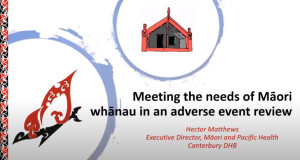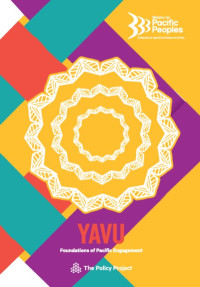Kia aro ki te ahurea
Culturally responsive practice considers that each person has their own culture, values and beliefs that must be acknowledged and supported when harm has occurred. This supports the importance of wairuatanga – upholding values, belief systems and world views.
Resources
 Hector Matthews presents on how better to support Māori and their whānau when reviewing an adverse event.
Hector Matthews presents on how better to support Māori and their whānau when reviewing an adverse event.
View Hector Matthews presentation here.
Te Tāhū Hauora is committed to its enduring priorities of embedding and enacting Te Tiriti o Waitangi and pursuing health equity.
Initially Pacific models for engagement resources were developed for use internally within our organisation to help put Pacific methodologies, frameworks and epistemologies at the centre of our thinking when considering working with our Pacific communities.
We are now making them available for the sector to use, digest, consider and implement into their engagements and co-design with Pacific communities.
The resources represent ‘bread and butter’ models that can enhance your understanding and practice. They are intended to be used with a wayfarer to guide you through their application. Please get in touch with our equity team here to discuss and unpack these resources together.
Resources
- Pacific models for engagement (all) (8MB, pdf)
- Fa’afaletui (854KB, pdf)
- Fofola e fala (238KB, pdf)
- Kakala (2MB, pdf)
- Talanoa (310KB, pdf)
- Vā (1MB, pdf)
References
Anae M. 2005. Teu le va: ‘New’ directions in thinking about doing Pacific health research in New Zealand. Paper presented at the Centre for Pacific Studies, University of Auckland Pacific Scholars Postgraduate Seminar Series.
Anae M. 2007. Teu le va: Research that could make a difference to Pasifika schooling in New Zealand. Paper commissioned by the Ministry of Education and presented at the joint NZARE/Ministry of Education symposium ‘Is your research making a difference to Pasifika education?’ in Wellington.
Havea S, Alefaio-Tugia S, Hodgetts D. 2021. Fofola e Fala ka e Talanoa e Kainga: A Tongan approach to family violence prevention and intervention. Journal of Pacific Rim Psychology 15.
Johansson Fua S. 2014. Kakala Research Framework: A Garland in Celebration of a Decade of Rethinking Education. Of Waves, Winds and Wonderful Things: A Decade of Rethinking Pacific Education. 50–60.
Tamasese K, Peteru C, Waldegrave C. 1997. Ole Taeao Afua: a qualitative investigation in Samoan perspectives on mental health and culturally appropriate services. Report for the Health Research Council of New Zealand. Wellington: The Family Centre.
Thaman KH. 1997. Kakala; A Pacific concept of teaching and learning. Paper presented at the Australian College of Education National Conference, Cairns.
Vaioleti TM. 2006. Talanoa research methodology: A developing position on Pacific research. Waikato Journal of Education 12: 21–34.
Vaioleti TM. 2011. Talanoa, manulua and founga ako: Frameworks for using enduring Tongan educational ideas for education in Aotearoa/New Zealand (Unpublished doctoral thesis). University of Waikato, Hamilton, New Zealand.
 Yavu is a Pacific engagement tool to support anyone working in local and central government and the private sector who engages with Pacific communities. It can be used to support initiatives, policies and decision making where Pacific peoples will be affected directly or indirectly.
Yavu is a Pacific engagement tool to support anyone working in local and central government and the private sector who engages with Pacific communities. It can be used to support initiatives, policies and decision making where Pacific peoples will be affected directly or indirectly.
Read the Yavu engagement tool here.
The Working with Māori online learning modules help health care workers increase their understanding of working effectively with Māori tāngata whai ora and whānau to improve health outcomes. View the modules here.
Meeting the needs of Māori in adverse event review
 Hector Matthews presents on how better to support Māori and their whānau when reviewing an adverse event.
Hector Matthews presents on how better to support Māori and their whānau when reviewing an adverse event.
View Hector Matthews presentation here.
Pacific models for engagement | Fakalofahai atu ki motolu oti
Te Tāhū Hauora is committed to its enduring priorities of embedding and enacting Te Tiriti o Waitangi and pursuing health equity.
Initially Pacific models for engagement resources were developed for use internally within our organisation to help put Pacific methodologies, frameworks and epistemologies at the centre of our thinking when considering working with our Pacific communities.
We are now making them available for the sector to use, digest, consider and implement into their engagements and co-design with Pacific communities.
The resources represent ‘bread and butter’ models that can enhance your understanding and practice. They are intended to be used with a wayfarer to guide you through their application. Please get in touch with our equity team here to discuss and unpack these resources together.
Resources
- Pacific models for engagement (all) (8MB, pdf)
- Fa’afaletui (854KB, pdf)
- Fofola e fala (238KB, pdf)
- Kakala (2MB, pdf)
- Talanoa (310KB, pdf)
- Vā (1MB, pdf)
References
Anae M. 2005. Teu le va: ‘New’ directions in thinking about doing Pacific health research in New Zealand. Paper presented at the Centre for Pacific Studies, University of Auckland Pacific Scholars Postgraduate Seminar Series.
Anae M. 2007. Teu le va: Research that could make a difference to Pasifika schooling in New Zealand. Paper commissioned by the Ministry of Education and presented at the joint NZARE/Ministry of Education symposium ‘Is your research making a difference to Pasifika education?’ in Wellington.
Havea S, Alefaio-Tugia S, Hodgetts D. 2021. Fofola e Fala ka e Talanoa e Kainga: A Tongan approach to family violence prevention and intervention. Journal of Pacific Rim Psychology 15.
Johansson Fua S. 2014. Kakala Research Framework: A Garland in Celebration of a Decade of Rethinking Education. Of Waves, Winds and Wonderful Things: A Decade of Rethinking Pacific Education. 50–60.
Tamasese K, Peteru C, Waldegrave C. 1997. Ole Taeao Afua: a qualitative investigation in Samoan perspectives on mental health and culturally appropriate services. Report for the Health Research Council of New Zealand. Wellington: The Family Centre.
Thaman KH. 1997. Kakala; A Pacific concept of teaching and learning. Paper presented at the Australian College of Education National Conference, Cairns.
Vaioleti TM. 2006. Talanoa research methodology: A developing position on Pacific research. Waikato Journal of Education 12: 21–34.
Vaioleti TM. 2011. Talanoa, manulua and founga ako: Frameworks for using enduring Tongan educational ideas for education in Aotearoa/New Zealand (Unpublished doctoral thesis). University of Waikato, Hamilton, New Zealand.
Yavu – foundations of Pacific engagement
 Yavu is a Pacific engagement tool to support anyone working in local and central government and the private sector who engages with Pacific communities. It can be used to support initiatives, policies and decision making where Pacific peoples will be affected directly or indirectly.
Yavu is a Pacific engagement tool to support anyone working in local and central government and the private sector who engages with Pacific communities. It can be used to support initiatives, policies and decision making where Pacific peoples will be affected directly or indirectly.
Read the Yavu engagement tool here.
Te Pou: Working with Māori online learning modules
The Working with Māori online learning modules help health care workers increase their understanding of working effectively with Māori tāngata whai ora and whānau to improve health outcomes. View the modules here.
